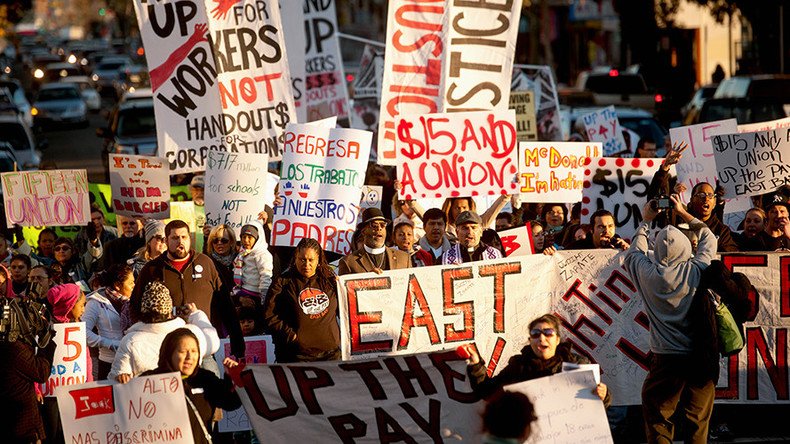New York, California reach deals to raise minimum wage to $15 per hour

New York and California lawmakers have raised their state’s minimum wages to $15 an hour, but specifics in the laws as to how and where workers will be affected reveal what compromises may be necessary for other states trying to do the same thing.
“When workers do well, our state thrives,” Hector Figueroa, president 32BJ Service Employees International Union in New York, said in a released statement. “This historic announcement of the largest increase in the minimum wage in generations will open the door to economic justice for millions of families and improve our economy from the bottom up.”
That same sentiment drove demands for a minimum wage increase during protests held in New York City back in 2012. The labor union-backed strike by fast food workers known as Fight for $15 grew as chapters formed around the country, championing unionization as well.
The $15 minimum wage victories call on us to win for excluded workers including freelance, domestic & "gig" on demand workers.
— Hector J Figueroa (@figue32bj) April 1, 2016
While the victory for those protests has come sooner than many expected, the new laws do come with caveats and nuances.
The New York law, for instance, does not uniformly increase wages statewide or even industry-wide. Employers in New York City will be required to pay their employees the $15 per hour minimum by the end of 2018, up from $9 currently, but businesses with 10 or fewer employees will have until 2021 to implement the increase.
Maria Velez, 29, supports her parents and grandparents with a $10 hourly wage working at a children’s program. While $15 represents a 50 percent raise, Velez isn’t sure how much that will truly mean by the time it kicks in.
“This city is crazy expensive and only getting worse,” Velez told The Associated Press. She said if the boost took effect immediately, “it would make my life and my family’s life better – but in five years? I can’t say.”
The owner of the New York City bakery La Bella Ferrera, Joseph Sferrazza, told the AP that paying $15 will cost him his bakery. The rate nearly doubles what he now pays his employees, mostly students working part-time.
“The rent is so high, the profit margin is already so low, I don’t see how we can make it work,” Sferrazza said. “You can only charge so much for a cookie.”
New York’s Republican lawmakers generally fought back against the measure, and under the new law, there are compromises for some parts of the state. Long Island and Westchester will have up to six years to reach $15, and areas north of Westchester, the minimum wage will rise by 70 cents over the next five years, eventually hitting $12.50 by the end of 2021. Further increases would be tied to inflation and other economic indicators.
“We’re leaders in economic justice,” Governor Andrew Cuomo said after the budget deal was announced late Thursday, according to The New York Times.
NY Senate approves $15 minimum wage plan as part of $156B budget deal https://t.co/fEIRfTRGb2
— NBC New York (@NBCNewYork) April 1, 2016
California lawmakers passed a similar measure on Thursday which will be signed into law on Monday by Governor Jerry Brown. Under the law, which passed along mostly partisan lines, the state will raise the minimum wage to $15 an hour over the next six years.
“At its core, this proposal is about fairness,” Senate President Pro Tem Kevin de Leon (D-Los Angeles) told The Los Angeles Times just before the vote. “This is historic, and today I am proud to be a Californian.”
After NY, Calif. successes, $15 minimum-wage movement looks for progress in other states: https://t.co/XvHOXnASOgpic.twitter.com/47NFS3CHXt
— AP Eastern U.S. (@APEastRegion) April 1, 2016
Under the California plan, the state's hourly minimum wage would increase from the current $10 to $10.50 by 2017, then to $11 the following year, and increase $1 annually until 2022. Businesses with fewer than 26 employees would get an additional year to comply. The increase could be delayed in an economic downturn, but with no pauses, the minimum wage would increase each year based on inflation starting in 2024.
Protesters swamp Miami outside GOP debate, fight for $15 min wage https://t.co/Khfeg84Uivpic.twitter.com/L5BdCcaxIJ
— RT America (@RT_America) March 11, 2016
Economists have estimated the measure would increase the pay of 5.6 million workers across the state, or nearly one in three.
Activists have seen cities such as Seattle, Los Angeles and San Francisco agree to increases to $15, and now they will set their sights on other similarly liberal, Democratic-led states.
Fight for $15: States strive to raise minimum wage [VIDEO] https://t.co/QHUwnQ7U5l@ManilaChanpic.twitter.com/FPpJHGajk1
— RT America (@RT_America) May 11, 2015
Illinois, Massachusetts, Michigan, New Jersey, Oregon, Rhode Island, Vermont and Washington are among the states with active "Fight for $15" efforts. On Friday, the Chicago chapter staged a workers’ strike, shutting down streets.
#ShutDownChi has shut down Lake Shore Drive. We'll have justice in this city. No compromise. pic.twitter.com/a0I00ccv5m
— Fight For 15 (@fightfor15) April 1, 2016
Beautiful: Black/Brown youth, fast food workers, teachers take streets to #ShutDownChi#FightForFunding#FightFor15pic.twitter.com/ibHE57MriP
— Fight For 15 Chicago (@chifightfor15) April 1, 2016
Activists also think the two big victories in California and New York will help to strengthen their efforts in more conservative and rural states in the South and the Midwest.












